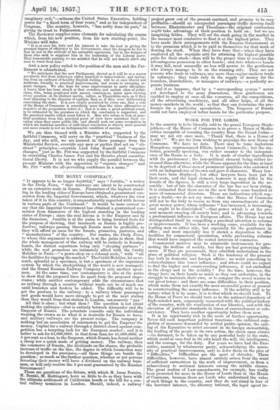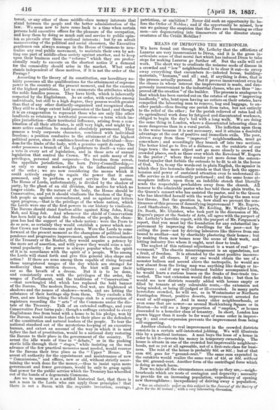WORK FOR THE LORDS.
IF the country is to be literally sold to the grand European Stookjobbers—if the House of Commons is to prove a House of Medio
crities incapable of rescuing the country from the Grand Judas— may we not cry once more, "Thank God, there is a House of Lords ! " We are far from wishing to prejudge the new House of Commons. We have no data. There may be tame inglorious Hampdens, unpronounced Billets, latent Cromwells ; but the statistics, generally speaking, run rather counter to the independence of the House as a body. It is made of similar ingredients with its predeoessor ; the non-political element being rather increased than otherwise, while the House appears for the time at least to be deprived of those men of prominent qualities who endowed it with an independence of its own and gave it character. Many lawyers have been displaced, but other lawyers have been put in their seats, and the legal element, however it may differ in the details of the figures, is still a very large ingredient in the assembly : but of late the character of the bar has not been rising. It is estimated that there are in the new House some hundred or more of commercial directors. These are indications which suggest a doubt—we do not say more—that the House of Commons will not be the body to rescue us from any encroachments of the great money power, whose influence "has increased, is increasing, and ought to be diminished"—that power which is at the present moment swaying all society here, and is advancing towards a predominant influence in European affairs. The House has not distinguished itself by compelling a practical attention to reforms or improvements. It has been a working corps, available for the leading men on either side, but especially for the gentlemen in. office ; and most especially has it shown a disposition to offer facilities for commercial speculation, while preventing reforms that would have impaired the vested interests of commerce.
Commercial motives may be admirable instruments for promoting the welfare of society, but they are bad governing influences. If they are paramount, they establish materialism in the place of political religion. Such is the tendency of the present day both in domestic and foreign affairs : we want something to counterbalance this lower influence ; and where could we expect to find the higher and countervailing influences, if not embodied in the clergy and in the nobility ? For the time, however, the clergy have on their hands as much as they can undertake, in the struggle to maintain their own, or to conquer the moral wastes in our great towns : and there are some difficulties in their position, which make them not exactly the most successful power at present in countervailing the money influence. If the nobility still is by nature what it is by name, it is to that which we should look. To the House of Peers we should turn as to the national depository of high-minded men, corporately connected with the political history of the country, with the vindication of our liberties, and with the elevation of patriotic standards in times of encroachment or subserviency. They have another opportunity before them now. It is an opportunity rich in the seeds of further opportunity. Never did such important political functions—the enforced com pletion of measures demanded by settled public opinion, the call ing of the Executive to strict account in its foreign stewardship, the leading of the people in its own action, the check upon abuses —lie dormant, to be taken up by any powerful body in the state, which could at once find in its own heart the will, the intelligence, and the courage, for the duty. For years we have had the Exe cutive, manned by whatsoever party, acknowledging the neces sity of practical improvements, only to defer them on the plea of "difficulties," Difficulties are the sport of chivalry. These difficulties, however, have almost entirely arisen from the want
of sufficient earnestness in the work of improvement, or from a subserviency to sectional interests among the middle classes.
The great section of Law-amendments, for example, has really been promoted far more in the House of Lords than in the House of Commons, because there are Lords who understand the value of such things to the country, and they do not stand in fear of the barrister interest, the attorney interest, the legal agent in
terest, or any other of those middle-class money: interests that stand between the people and the better administration of the law. We seem now to have come back to a time when certain persons hold executive offices for the pleasure of the occupation, and keep them by doing so mush suit and service to public opinion as prevails over these sectional interests ; but by an adroit manceuvering of the political and social chessmen, the Executive gentlemen can always manage in the House of Commons to neutralize any real public movement, to maintain their own by setting one part of middle-class society against another, and to keep upon their business card the "reforms" which they are professionally ready to execute on the shortest notice if a demand for the commodity should arise in the market. What order stands independent of these motives, if it is not the order of the Peerage ? According to the theory of its constitution, our hereditary nobility possesses all the qualifications for the attainment of supreme power in the country at the present moment, and for the exercise of the highest patriotism. Let us enumerate the attributes which the noble families possess. They have birth, which is inherently respected by the Englishman. As an order, with varieties among individuals, but still to a high degree, they possess wealth greater than that of any other distinctly-organized and recognized class. They still to a large extent hold possession of the lend; and though it is an exaggeration to represent those who are only like other landlords as retaining a territorial possession—a term which implies jurisdiction—their territorial influence, arising from a combination of all their attributes, is still very high, and might by a more active condition be rendered absolutely paramount. They possess a truly corporate character, combined with individual freedom ; a position conducive to the attainment of the highest political power, since it combines freedom of the individual—freedom for the limbs of the body, with a genuine esprit de corps. The order possesses a branch of the Legislature to itself—is voice and a veto in every act of legislation, and in those acts of annual legislation that control the Crown. We set aside many of its privileges, personal and corporate—the freedom from arrest, the appellate jurisdiction, the born Privy-Councillorship,— as only so many makeweights in the influential position of the order ; we are now considering the means which it could actively employ to regain the power that it once possessed, and to perform a great service for the nation. The House of Lords, unfortunately, is divided by the shadow of party, by the ghost of an old division, the motive for which no longer exists. By the nature of the body, the House should be Conservative, and yet it should vindicate the freedom of the English people as against encroachment, and as against any fetters upon progress,—that is the privilege of the whole nation, which the Lords were one of the first powers in our history to vindicate. The Barons should stand fearless alike against King John, King Mob, and King Job. And whenever the shield of Conservatism has been held up to defend the freedom of the people, the champion has had the support of the whole nation: were the Peers to do so now, as certainly they would establish a power which neither Crown nor Commons can put down. Were the Lords to come forward at the present moment as the champions of political independence and progressive improvement, against the encroachment of the Treasury or the Market, they would acquire a potency by the mere act of assertion, and with power they would seize a universal popularity ; for power is always popular when the spirit of it is in accordance with the spirit of a people. Who among the Lords will stand forth and give this general idea shape and notion? If there are none among them capable of rising beyond those unregistered usages of the day which are stronger for mediocritY than written decrees, the hint will pass their ear as the breath of a dream. But it is to be done, and consistently even with the privileges of the order, the usages of Parliament, 'and the traditions of "Conservatism" —that newfangled idol which has replaced the bold banner of the Barons. The modern Barons, God wot, are frightened at shadows and the names of shadows—words, and are letting the substance of their heritage slip from them. They exclude a life Peer, and are letting the whole Peerage sink to a corporation of registrars recording the " acts " of the Commons under the ,dictate of the Treasury. Talk of an extended suffrage, and your Conservative Peer turns pale ; though a suffrage extended to every Englishman free from bond with a home to be his pledge, won by the Barons, would restore the Lords to their place as the defenders of the constitution and natural leaders of the people. To tear the national standard out of the mysterious keeping of an executive bureau, and extort an account of the way in which it is used before the fact of prostitution, would be a national duty restoring the Barons to their place in the government of the country. To arrest the idle waste of time in "debate," or in the pushing sterile bills through their "stages," while insisting on the real advance of the few practical measures most needed, would recover for the Herons their true place as the " Upper " House. To arrest all authority for the appointment and maintenance of new "Commissions," and offices, new or old, without strictly ascertaining the work done for the money,—thus to insist upon more government and fewer governors, would be only to grasp again that power for the public service which the Treasury has wheedled out of the hands of a degenerate Commons.
Are we to assume it as a settled historical fact, that there is not a man in the Lords who can apply these principles ? that there is not a Baron with the requisite invention, courage,
patriotism, or ambition ? Never did such an opportunity lie before the Order of Nobles ; and if the opportunity be missed, how can we gainsay the suspicion that the Peers are becoming as other men—are der•benerating into timeservers of the director stamp creatures of the Credit Mobilier ?



























 Previous page
Previous page